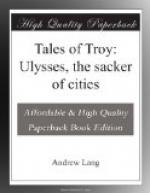She had fairy gifts; for instance, she had a great red jewel, called “the Star,” and when she wore it red drops seemed to fall from it and vanished before they touched and stained her white breast—so white that people called her “the Daughter of the Swan.” She could speak in the very voice of any man or woman, so folk also named her Echo, and it was believed that she could neither grow old nor die, but would at last pass away to the Elysian plain and the world’s end, where life is easiest for men. No snow comes thither, nor great storm, nor any rain; but always the river of Ocean that rings round the whole earth sends forth the west wind to blow cool on the people of King Rhadamanthus of the fair hair. These were some of the stories that men told of fair Helen, but Ulysses was never sorry that he had not the fortune to marry her, so fond he was of her cousin, his wife, Penelope, who was very wise and good.
When Ulysses brought his wife home they lived, as the custom was, in the palace of his father, King Laertes, but Ulysses, with his own hands, built a chamber for Penelope and himself. There grew a great olive tree in the inner court of the palace, and its stem was as large as one of the tall carved pillars of the hall. Round about this tree Ulysses built the chamber, and finished it with close-set stones, and roofed it over, and made close-fastening doors. Then he cut off all the branches of the olive tree, and smoothed the trunk, and shaped it into the bed-post, and made the bedstead beautiful with inlaid work of gold and silver and ivory. There was no such bed in Greece, and no man could move it from its place, and this bed comes again into the story, at the very end.
Now time went by, and Ulysses and Penelope had one son called Telemachus; and Eurycleia, who had been his father’s nurse, took care of him. They were all very happy, and lived in peace in rocky Ithaca, and Ulysses looked after his lands, and flocks, and herds, and went hunting with his dog Argos, the swiftest of hounds.
THE STEALING OF HELEN
This happy time did not last long, and Telemachus was still a baby, when war arose, so great and mighty and marvellous as had never been known in the world. Far across the sea that lies on the east of Greece, there dwelt the rich King Priam. His town was called Troy, or Ilios, and it stood on a hill near the seashore, where are the straits of Hellespont, between Europe and Asia; it was a great city surrounded by strong walls, and its ruins are still standing. The kings could make merchants who passed through the straits pay toll to them, and they had allies in Thrace, a part of Europe opposite Troy, and Priam was chief of all princes on his side of the sea, as Agamemnon was chief king in Greece. Priam had many beautiful things; he had a vine made of gold, with golden leaves and clusters, and he had the swiftest horses, and many strong and brave sons; the strongest and bravest was named Hector, and the youngest and most beautiful was named Paris.




